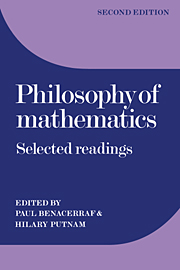Book contents
- Frontmatter
- Contents
- Preface to the second edition
- Introduction
- Part I The foundations of mathematics
- Part II The existence of mathematical objects
- Empiricism, semantics, and ontology
- On platonism in mathematics
- What numbers could not be
- Mathematics without foundations
- Part III Mathematical truth
- Part IV The concept of set
- Bibliography
Mathematics without foundations
Published online by Cambridge University Press: 05 June 2012
- Frontmatter
- Contents
- Preface to the second edition
- Introduction
- Part I The foundations of mathematics
- Part II The existence of mathematical objects
- Empiricism, semantics, and ontology
- On platonism in mathematics
- What numbers could not be
- Mathematics without foundations
- Part III Mathematical truth
- Part IV The concept of set
- Bibliography
Summary
Philosophers and logicians have been so busy trying to provide mathematics with a ‘foundation’ in the past half-century that only rarely have a few timid voices dared to voice the suggestion that it does not need one. I wish here to urge with some seriousness the view of the timid voices. I don't think mathematics is unclear; I don't think mathematics has a crisis in its foundations; indeed, I do not believe mathematics either has or needs ‘foundations’. The much touted problems in the philosophy of mathematics seem to me, without exception, to be problems internal to the thought of various system builders. The systems are doubtless interesting as intellectual exercises; debate between the systems and research within the systems doubtless will and should continue; but I would like to convince you (of course I won't, but one can always hope) that the various systems of mathematical philosophy, without exception, need not be taken seriously.
By way of comparison, it may be salutory to consider the various ‘crises’ that philosophy has pretended to discover in the past. It is impressive to remember that at the turn of the century there was a large measure of agreement among philosophers – far more than there is now – on certain fundamentals. Virtually all philosophers were idealists of one sort or another. But even the nonidealists were in a large measure of agreement with the idealists.
- Type
- Chapter
- Information
- Philosophy of MathematicsSelected Readings, pp. 295 - 312Publisher: Cambridge University PressPrint publication year: 1984
- 5
- Cited by

